How Christmas Markets Contribute to Local Economies and Foster Community Spirit
Christmas markets play a crucial role in boosting local economies and communities. These markets transform city squares into bustling hubs of activity, drawing tourists and locals alike. The presence of a Christmas market can significantly increase visitor spending in the area.
More foot traffic means more sales for nearby shops and restaurants, revitalizing local commerce during a typically slow season.
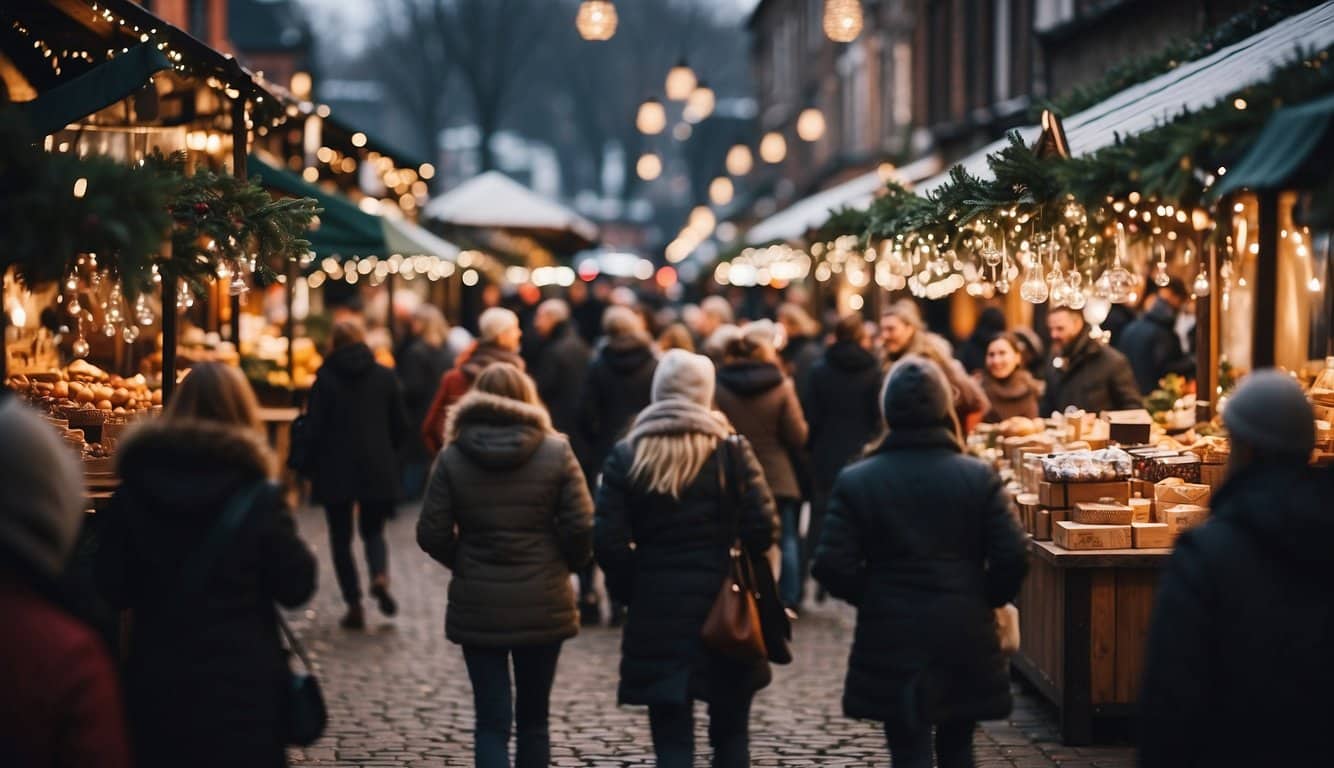
When you stroll through a Christmas market, you’re not just enjoying the lights and music; you’re supporting local vendors and artisans. Many of the stalls are run by small businesses selling handmade goods, unique gifts, and delicious treats. This kind of direct engagement with the community fosters a sense of connection and helps sustain local trades.
Moreover, Christmas markets create temporary job opportunities, providing employment in areas such as event setup, security, and vendor staffing. This influx of seasonal jobs can be a lifeline for many during the holiday season. By promoting both cultural and economic growth, these festive markets become a cherished part of the community’s identity and contribute to its long-term development.
Table of Contents
- 1 Boosting Tourism And Visitor Spend
- 2 Job Creation And Employment Opportunities
- 3 Promoting Local Businesses And Artisans
- 4 Enhancing Cultural Connections And Community Spirit
- 5 Long-Term Economic Growth And Development
- 6 Frequently Asked Questions
- 6.1 What economic impacts do Christmas markets have on local businesses?
- 6.2 How do Christmas markets affect tourism and visitation in a community?
- 6.3 In what ways do Christmas markets support local craftsmen and artisans?
- 6.4 Can Christmas markets influence the social cohesion of communities, and how?
- 6.5 What role do Christmas markets play in preserving local traditions and cultural heritage?
- 6.6 How can small businesses benefit from participating in Christmas markets?
Key Takeaways
- Christmas markets boost tourism and visitor spending in local areas.
- They support local businesses and create seasonal job opportunities.
- These markets enhance community spirit and cultural connections.
Boosting Tourism And Visitor Spend
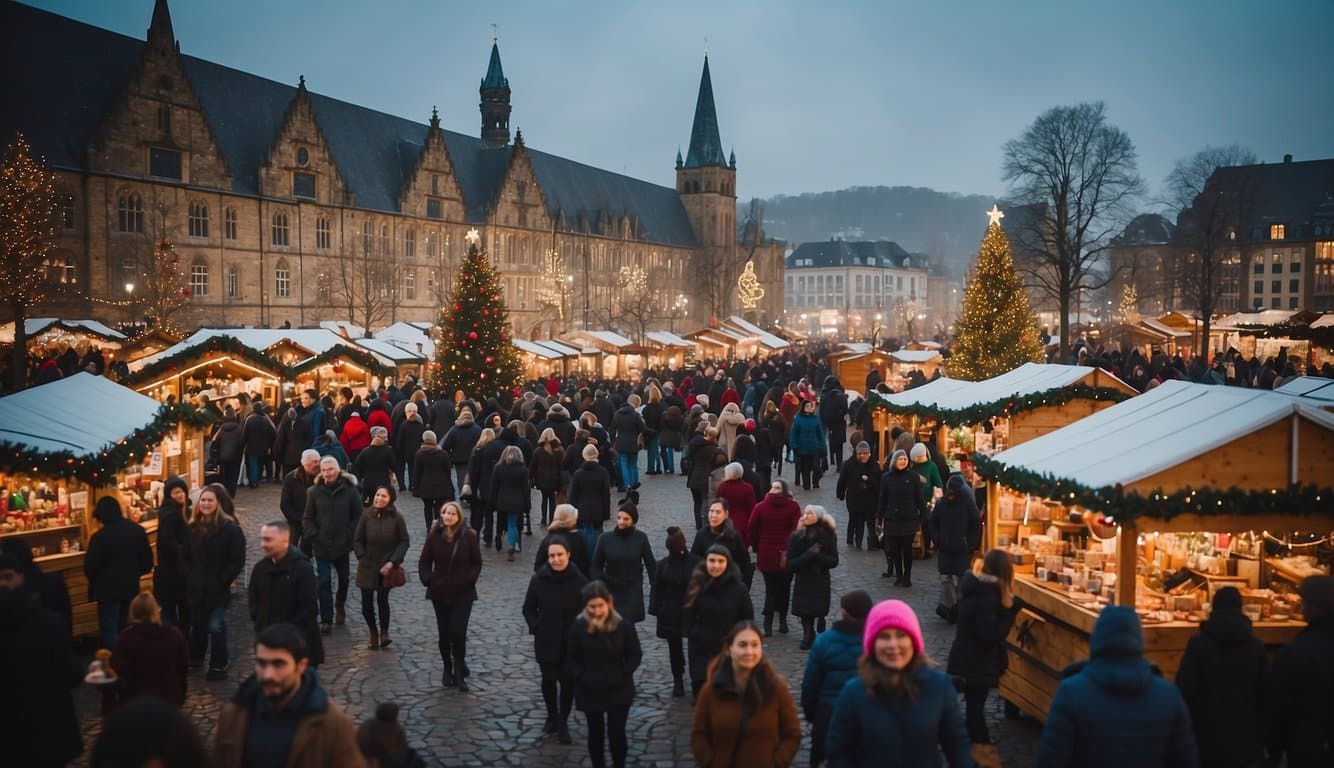
Christmas markets bring vibrant energy to local economies, boosting tourism and increasing visitor spending. These festive events attract both domestic and international tourists, drive seasonal tourism, and have notable economic benefits.
Find the best accommodations and airfares
Check availability at 5* hotels, guest houses and apartments rated "superb" or "exceptional" by visitors just like you.
NO RESERVATION FEES
CHECK AVAILABILITY FOR YOUR DATES HERE
Attracting Domestic And International Tourists
Christmas markets are a magnet for both local and international visitors. Vibrant stalls, festive lights, and unique cultural experiences draw people from near and far. The offerings often include unique crafts, delicious holiday foods, and special performances that create a warm holiday atmosphere.
People plan trips specifically around these markets, increasing hotel bookings, restaurant sales, and other local expenditures. These tourists not only spend money at the markets but also boost nearby business revenues.
Unique attractions, like traditional German gluhwein or hand-painted ornaments, often tempt visitors to splurge, further contributing to the local economy.
Seasonal Tourism And Its Economic Benefits
During the holiday season, the local economy typically experiences a lull. Christmas markets fill this gap by increasing visitor numbers and encouraging spending. Seasonal stalls offer limited-time products that tourists are eager to buy, which helps local artisans and small businesses.
The markets create jobs, from stall operators to security personnel. This seasonal employment increases income for residents. The increased foot traffic also means more sales for local shops and restaurants, with boosts in revenue supporting the community long after the markets close.
Christmas markets can breathe life into an otherwise quiet season, providing financial stability for businesses relying on holiday sales.
Case Studies Of Popular Christmas Markets
Different towns and cities have their own stories of market success. For instance, the famous markets in Edinburgh feature more than 100 stalls and attract visitors from across Europe. This influx of tourists benefits hotels, restaurants, and nearby attractions.
In Birmingham, the annual Christmas market, with its German-themed booths, brings millions of pounds in revenue. Local businesses report a significant uptick in sales during market weeks.
Smaller markets, like the two-day event in a small town analyzed in a joint LGA and NABMA report, show that even brief markets can have a major economic impact. These markets increase economic activities by drawing crowds and encouraging spending on local goods.
Job Creation And Employment Opportunities

Christmas markets can boost local economies by creating various job opportunities, enhancing workforce skills, and sharing success stories of individuals who gained employment through these festive events.
Seasonal Job Opportunities
Christmas markets offer a range of seasonal job opportunities that can help you get temporary work during the busy holiday season.
From selling crafts and festive foods to managing stalls, there’s a lot of work to go around. These markets need people to help set up and break down stalls, decorations, and lighting as well, providing jobs in construction and logistics.
This temporary work can offer a significant income boost and give you valuable work experience.
Impact On Local Workforce Development
These markets don’t just create jobs; they also help with local workforce development.
As you work in different roles, you’ll gain various skills, from customer service to inventory management. Some markets even provide training sessions that teach you new skills, which can be helpful for future employment.
Plus, working at these markets often involves engaging with tourists, which can improve your communication skills and make you more adaptable.
Success Stories Of Employment Through Christmas Markets
There are many success stories of people who found lasting employment through their work at Christmas markets.
For instance, some seasonal workers have turned their temporary stalls into permanent businesses, gaining a loyal customer base. Others have used the skills they learned to move into other sectors, such as retail or hospitality.
These success stories show the wider impact of Christmas markets on personal careers and local economies.
Promoting Local Businesses And Artisans
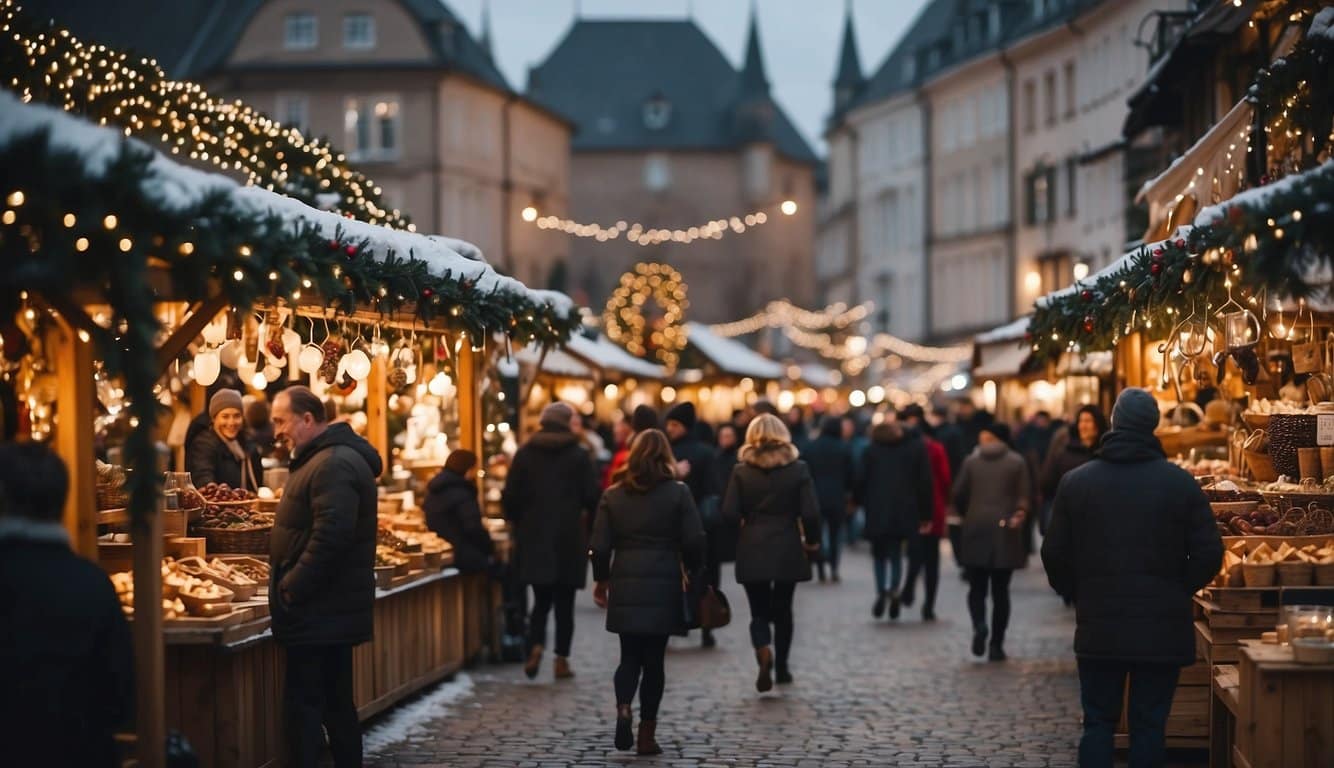
Christmas markets serve as vital platforms for local businesses and artisans. These markets provide unique selling opportunities and help in showcasing local crafts and products, thereby offering numerous benefits to small businesses and startups.
Vendor Opportunities For Local Businesses
Christmas markets offer a prime opportunity for local businesses to reach a broader audience. By setting up stalls, they can attract customers who are enthusiastic about seasonal shopping.
Local food producers and artisans can showcase their goods and services, allowing them to compete with larger retailers.
This direct-marketing approach opens up new revenue streams, crucial for small and mid-sized farmers looking to sell fresh produce and other products.
Additionally, engaging with customers can help businesses gather feedback and improve their offerings. This interaction fosters a sense of community and allows for personal connections between buyers and sellers.
Showcasing Local Crafts And Products
Christmas markets are perfect for highlighting the talents of local artisans.
Shoppers enjoy browsing unique, handmade items that they wouldn’t find in regular stores.
This environment provides artisans with an ideal stage to present their craft, whether it’s farm-direct marketing of local produce or crafted goods.
These markets often feature farmers’ markets within them, allowing vendors to sell organic goods and other specialty items.
This emphasis on local, sustainable practices helps promote the value of locally grown and produced items, making it easier for artisans and farmers’ markets to gain visibility.
Benefits To Small Businesses And Startups
Participating in Christmas markets can be particularly advantageous for small businesses and startups.
These events allow you to test the market for new products in a low-risk environment. The costs are generally lower than traditional retail spaces, making it easier for small vendors to set up shop and attract customers.
Selling directly to consumers also eliminates the need for intermediaries, increasing profit margins for producers of local food and other goods.
Additionally, the festive atmosphere draws in crowds, providing an upswing in sales that can significantly bolster a startup’s bottom line.
Engaging in these markets not only enhances sales but also helps build brand awareness, a critical factor for any new business.
Whether you’re a small farm stand or a fledgling craft maker, Christmas markets can provide the boost needed to thrive.
Enhancing Cultural Connections And Community Spirit
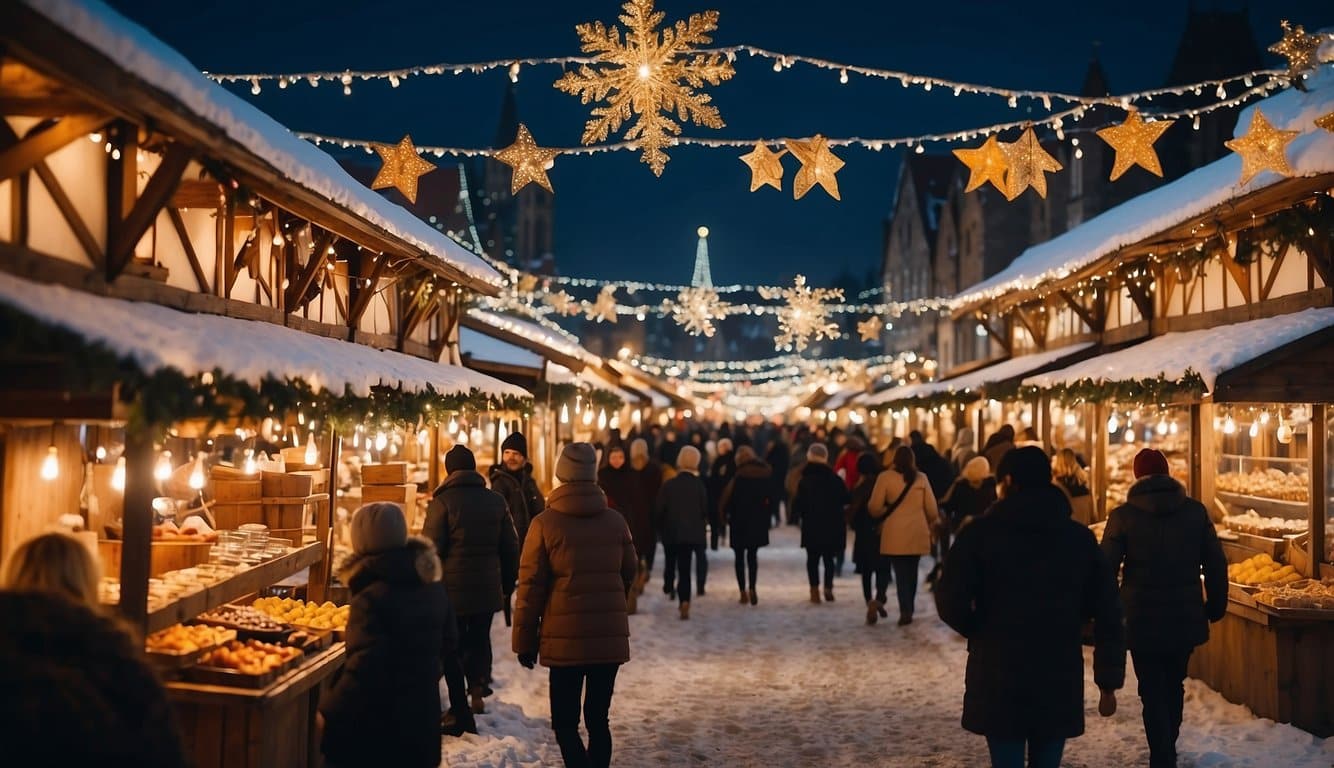
Christmas markets are more than just a festive activity. They connect local traditions, encourage community involvement, and bring everyone closer together.
Celebrating Local Traditions And Cultures
Christmas markets are not only about holiday shopping; they celebrate local traditions and cultures. Vendors often sell handmade crafts and traditional holiday items, giving you a taste of local heritage.
According to an article on itschristmasnow.com, these markets often feature live entertainment and holiday decorations, enriching the experience.
You get a glimpse into the unique customs of the community. This authenticity makes Christmas markets more than just shopping venues. They become cultural hubs where you can learn about the history and traditions of your neighbors.
Community Involvement And Volunteerism
Christmas markets thrive on community involvement and volunteerism. Local individuals and organizations come together to organize and run these markets.
This shared effort fosters strong partnerships and brings people closer. For example, the High Streets Task Force highlights how these markets contribute to economic wellbeing by involving local stakeholders.
Volunteers play a crucial role, from setting up stalls to managing events. Your participation not only supports local vendors but also strengthens community bonds.
When you volunteer, you contribute to community development and promote a sense of togetherness.
Christmas markets offer various social benefits that contribute to community bonding. These events provide a space where you can meet and interact with neighbors, enhancing social connections.
HS Communities points out that cultural events like these help preserve traditions and foster community spirit.
The social learning and innovation that occur in these markets are vital for community health. By bringing together diverse groups, Christmas markets become a melting pot of ideas and cultures. This social mix encourages healthier community interactions and contributes to public health by promoting mental well-being.
So, next time you visit a Christmas market, know that you’re not just there for shopping. You’re participating in a celebration of culture, community, and collective joy.
Long-Term Economic Growth And Development
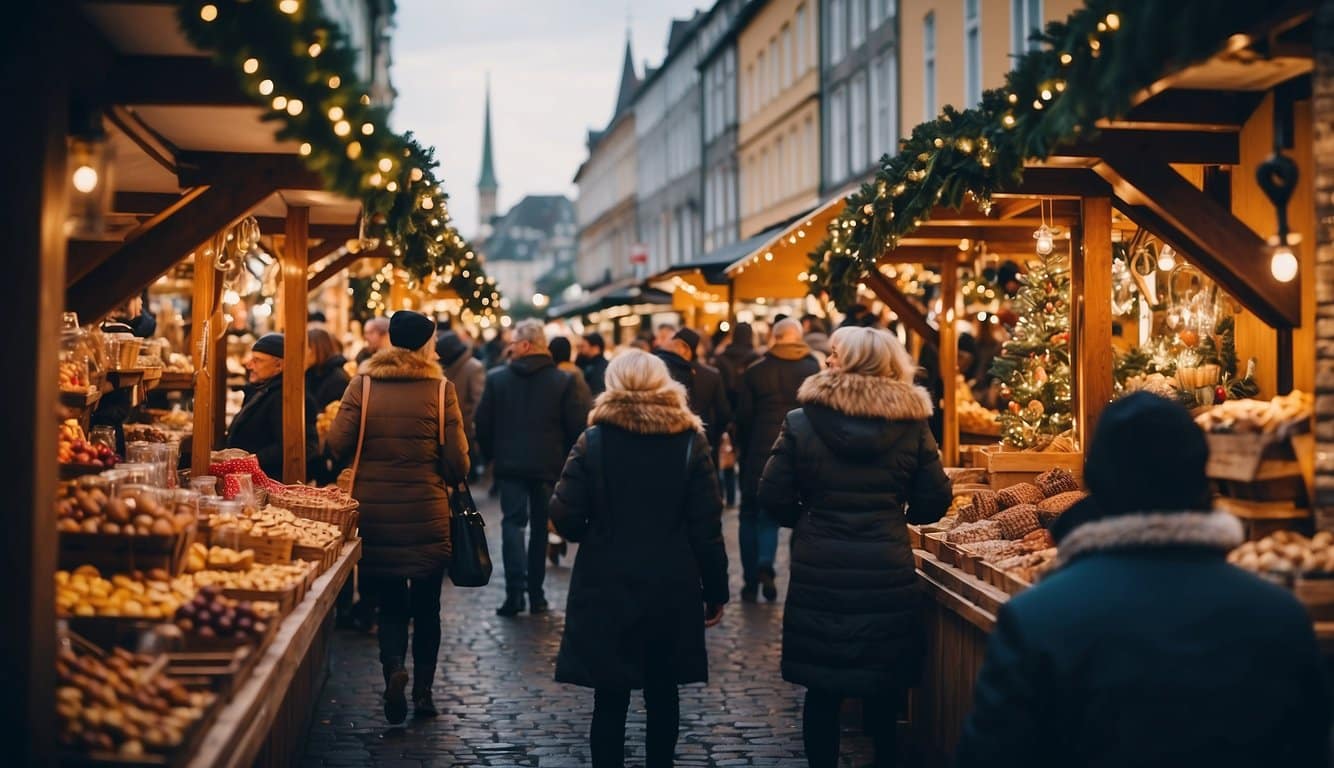
Christmas markets aren’t just about holiday cheer; they play a significant role in fostering long-term economic benefits, improving local infrastructure, and promoting strategic planning for sustainable growth.
Sustained Economic Benefits Beyond The Season
Christmas markets create an economic boost that extends beyond the holiday season. When you spend money at these markets, it doesn’t stop there. This spending creates a multiplier effect, where that money gets re-spent in the local economy.
Vendors use their profits to buy supplies, hire local staff, and pay local taxes.
This continuous flow of money can lead to local economic development. For example, the extra income earned by small businesses could enable them to expand, further stimulating economic activity. This helps boost the overall economic well-being of the community, making these events more than just seasonal attractions.
Impact On Local Infrastructure And Services
The influx of visitors to Christmas markets often necessitates improvements to local infrastructure. To accommodate the crowds, towns might upgrade public transport, improve zoning regulations, and invest in better urban planning.
This can lead to long-term benefits for local communities.
For instance, better roads and transport services not only make it easier for people to visit the markets but also enhance daily commutes for residents. Expanded public services such as waste management and security can further boost the quality of life. These enhancements make the community more attractive for future events and long-term investments.
Strategic Planning And Support From Local Governments
Successful Christmas markets don’t just happen; they require careful planning and support from local governments.
By employing strategic management and policy approaches, local governments can ensure that these markets benefit everyone and help drive local economies.
This might include zoning regulations that make it easier for small businesses to set up stalls or tax incentives to encourage participation.
Additionally, local governments may invest in marketing campaigns to attract visitors from outside the area, amplifying the market’s economic impact. For rural communities, these strategies can be a game-changer, bringing much-needed attention and investment.
Frequently Asked Questions
Christmas markets bring significant benefits to local economies and communities. From boosting small businesses to enhancing social cohesion, these festive events play a vital role.
What economic impacts do Christmas markets have on local businesses?
Christmas markets can lead to a substantial increase in sales for local businesses. A report found that Christmas markets contributed to an estimated total visitor spend of around £500 million in the UK in 2017.
How do Christmas markets affect tourism and visitation in a community?
Christmas markets attract visitors from near and far, leading to a boost in tourism. Cities like Portland see increased foot traffic, filling hotels, restaurants, and shops, which benefits the local economy.
In what ways do Christmas markets support local craftsmen and artisans?
These markets create valuable selling opportunities for local artisans. Offering handmade products, they can directly connect with customers who appreciate unique, locally made items, providing exposure and sales that might not be possible otherwise.
Yes, Christmas markets can bring people together, fostering a sense of community. The festive atmosphere, combined with shared cultural activities, helps strengthen bonds among residents. This can be especially impactful in diverse cities like Detroit.
What role do Christmas markets play in preserving local traditions and cultural heritage?
They help keep local traditions alive by showcasing regional customs, foods, and crafts. Christmas markets often feature traditional music, dance, and decorations, which helps educate new generations about cultural heritage.
How can small businesses benefit from participating in Christmas markets?
Small businesses gain visibility and access to a broader customer base at these markets. They can boost their sales and build a loyal customer base by offering products in a festive, high-traffic environment.
Additionally, local authorities sometimes provide licensing support and incentives for small business participation.
Christmas Market Closures
Due to econonic conditions and tariffs, some Christmas Markets may cancel their events due to lack of vendors. If you are aware of a closed market,or find errors on a listing or an image, please reach out on our Contact Us page so that we may update this post.




